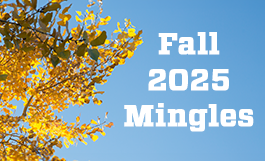2025 Bilinski Foundation Fellowship Recipients
Jessica Cochran
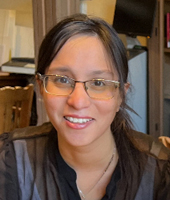
Jessica Cochran is a PhD candidate in History at the University of New Mexico. Her interests include Western handwriting, frontiers and borders, animals in the medieval world, and pedagogy in the history classroom. In addition to support from the Bilinski Foundation, her research has also been generously supported by the UNM Institute for Medieval Studies and the UNM Department of History. Jessica regards medieval handwriting as vital to Europe’s tangible and intangible culture. Her dissertation frames European handwriting as a culturally commodified component of medieval life that constantly stood at the crossroads of spiritual, intellectual, and linguistic economies.
Jorge Hernandez
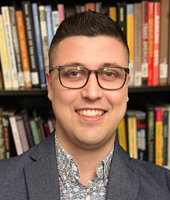
Jorge A. Hernández Jr. is a Ph.D. candidate in UNM’s Department of Spanish and Portuguese. He specializes in Hispanic literature, focusing on Mexican American literary, cultural, and urban studies. His dissertation, Corazones Urbanos, examines literary and nonfictional narratives regarding the discursive and spatial displacement of regional Mexican American communities, particularly as manifested in Tucson, Albuquerque, and San Antonio during the 20th century. His project aims to understand how Mexican American writers from these communities have interpreted, mediated, and critiqued the racially charged discourses and radicalized political agendas that have sought to dispossess, disenfranchise, and displace established ethnic communities from historic downtown landscapes in favor of affluent city elites and newcomers and their racialized capitalistic development. He received his M.A. in Spanish and B.A. in Foreign Languages and History from New Mexico State University.
Sarah Knopp
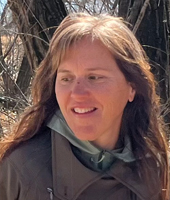
Sarah Knopp is a PhD Candidate in American Studies at the UNM, and also holds an MA in History with a specialty in Latin America and the US West. Her dissertation examines contested visions of the water-energy-finance nexus in New Mexico. She focuses on grassroots efforts to reshape the economic development priorities of extractive industries and the New Mexico state government, and communities’ demands for cleanup, compensation, and reparations. She has also written about transnational collaboration on gang truces between Los Angeles and El Salvador, and other organic solutions to colonial violence. Her work is interdisciplinary and draws on the disciplines of history, visual culture and art history, cultural criticism, political economy, and critical Indigenous studies.
Sarah Lease
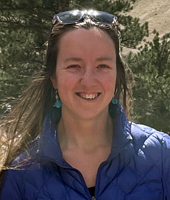
Sarah Lease is a Ph.D. candidate in the Department of Linguistics. In her research, she draws on usage-based approaches and acoustic methods to study language acquisition and variation among Spanish-speaking children and adults. Within this, she is mostly concerned with understanding the extent to which repeatedly using words in specific contexts shapes speech production and mental representations of language. Her dissertation focuses on how this repeated and cumulative usage shapes Spanish-speaking children’s and adults’ pronunciation of Spanish words.
Madeline Mendoza
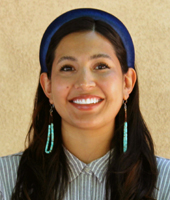
Madeline Rose Mendoza (Pueblo of Laguna, Ohkay Owingeh, Chicana) is a Ph.D. candidate in Rhetoric and Writing at the University of New Mexico. Her dissertation develops Indigenous Futurisms as a critical rhetorical framework to disrupt colonial epistemologies in higher education and to reimagine teaching, learning, and writing as practices of relational, decolonial futurity. Through a qualitative study of student multimodal narratives, Madeline centers land as relative, teacher, and continuum, illustrating how Indigenous Futurisms—including slipstream, environmental sustainability, apocalypse, contact, and resurgence—invite students to envision alternative futures through speculative writing, engage in land-based reflection, and practice collective praxis grounded in Indigenous knowledges across time. Her work contributes to Indigenous rhetorics, critical Indigenous studies, composition studies, literary studies, and decolonial pedagogy.
Kara Roanhorse
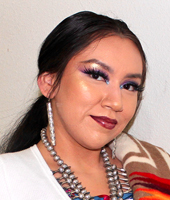
Kara Roanhorse (Diné) is a Ph.D. candidate in American Studies. Her research centers Indigenous youth as critical theorists of decolonial futures, tracing histories of resistance, kinship, and care across geographies marked by settler colonial violence. Grounded in Diné/Indigenous knowledge and feminist praxis, her work engages oral histories, archival analysis, and political movements to examine how youth reclaim sovereignty towards the ends of decolonization. Kara draws on the metaphor of stars and sovereignty to emphasize how young people carry ancestral and inspirational knowledge forward, refusing erasure while charting new constellations of Indigenous life, everyday refusal, and liberation.
Devin Tankersley

Devin Tankersley is a PhD candidate in the Linguistics Department whose research focuses on how iconicity impacts interpretation of meaning, lexical and phonological variation, and language access. His dissertation will be based on his 10 months spent in Taiwan interviewing members of deaf communities across the country, examining how variation in Taiwan Sign Language has been maintained in the traditional northern and southern dialects, while at the same time uncovering how signers have blended the two dialects to form a more readily understood supralect. Devin also plans to use this data to construct an online database that will allow TSL signers to see the variation in their language across Taiwan.
